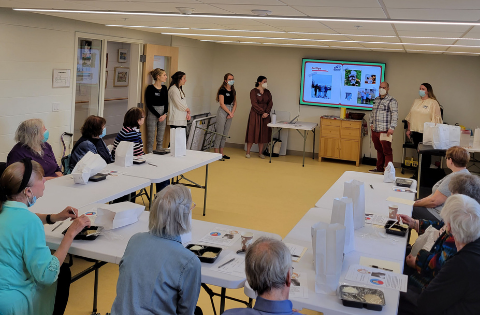Communication Sciences & Disorders and Occupational Therapy Students Collaborate on Community Education Project
I teach the swallowing disorders class to the communication sciences and disorders graduate students and one of their assignments this semester consisted of a community education project. The education was aimed at increasing awareness of the changes that occur with age related to swallowing. We termed the education project, “Sw-ellness.”

In my career as a speech pathologist, I have experienced that people have very limited knowledge about the swallowing process, especially how the mechanism changes over time, which may lead to a disorder. The students provided education on the natural changes in swallowing – slower swallow reflex/eating, food/liquid entering the airway, an increase in food leftovers in the throat – and how these are still considered functional. Additionally, education was provided on the signs and symptoms of a swallowing disorder, consequences of a disorder and general management.
For the presentation at the Portsmouth Senior Center, I collaborated with clinical associate professor John Wilcox and his graduate occupational therapy students, who provide wellness education on different topics to the Senior Center members. Professor Wilcox graciously provided time for my CSD graduate students to participate in their wellness education series. He also supported collaboration with this project by arranging the presentation to the Occupational Therapy Stroke Support Group.
The students in both disciplines benefit from this collaboration, as both speech-language pathologists and occupational therapists work closely with the management of swallowing disorders. Both cohorts gain a better understanding of each of their roles specific to their discipline, and also gain an appreciation of the value of collaborating together.